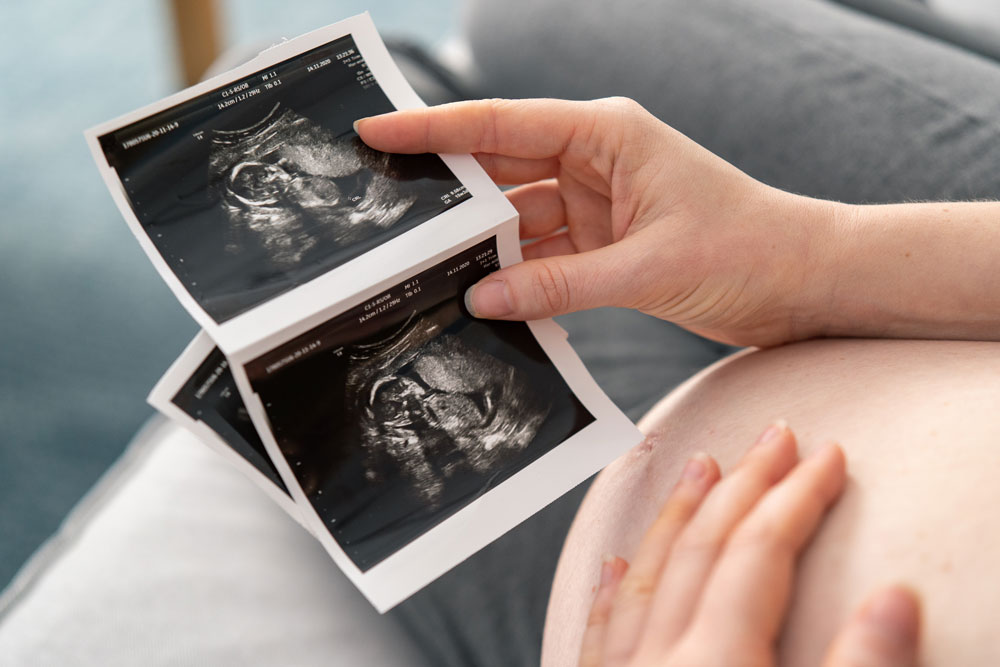Obstetric Care
Obstetric Care
We provide full pregnancy care, from pre-conception counseling to conception, pre-natal care, delivery, and afterwards. Regular doctor visits are important to ensure prenatal care contributes successfully to baby’s healthy development and for monitoring of baby’s health. We check baby’s heart rate and mother’s blood pressure, urine, and weight gain. Ultrasounds are performed to visually check on baby’s development.
Pre-conception Counseling
Our goal is to provide moms-to-be and their partners with meaningful information that guides pregnancy planning and reproductive options. The pre-conception visit should occur at least 3 months before trying to get pregnant. Many factors are in a mother’s control that impact baby’s health, especially during the first 8 weeks of fetal growth and development. A preconception visit consists of a thorough medical history, comprehensive physical exam (Pap smear, cervical cultures, blood test), and discussion of diet, medical conditions, and medications that can cause problems in pregnancy. Options will be discussed for preconception genetic screening and existing medical conditions.
Pregnancy Testing
A pregnancy test checks blood or urine for a hormone called human chorionic gonadotropin (hCG). The amount rises steeply during the first 12 weeks of pregnancy. Home pregnancy urine tests vary in their sensitivity to hCG. Most are best used 1-2 weeks after a missed period. Whether the test is positive or negative, an OB/GYN should confirm the result with a blood test because false-positive and false-negative results can happen. Blood test results are 99% accurate and can detect lower amounts of hCG than home urine tests.
Prenatal Care
First Prenatal Visit
The first prenatal visit includes drawing blood for labs, a full pelvic exam, and a Pap smear and cultures to rule out infections or problems. We take a full medical history, discuss any health problems, review past pregnancies, evaluate supplements or medications taken, discuss exercise, review smoking or alcohol consumption, and review genetic disorders or health problems that run in the family. Expect us to recommend lifestyle changes to ensure baby’s healthy development.
Prenatal Nutrition
Good nutrition is linked to a baby’s brain development and birth weight, and it reduces the risk of birth defects. Healthy weight gain during pregnancy is important for the development of the placenta, amniotic fluid, uterus breasts, blood supplies, and fat stores. Essential nutrients include protein, DHA, Vitamin C, fat, calcium, iodine, iron, and folic acid. Our doctors provide dietary guidelines, including vitamin supplementation. We also provide a list of problematic foods to avoid.

Fetal Testing
We offer a variety of screenings, test, and imaging techniques during pregnancy to provide information about the health of the baby and optimize prenatal care and development. These include:
- Genetic Screening – to diagnose genetic abnormalities before birth (e.g., sickle cell, Tay-Sachs, cystic fibrosis)
- First Trimester – a combination of fetal ultrasound and maternal blood testing to determine if the fetus may have a birth defect such as Down syndrome
- Second Trimester – includes blood tests called multiple markers to provide information about the potential risk of having a baby with genetic conditions or birth defects
- Ultrasound – may be conducted at various times throughout pregnancy to establish due date, diagnose an ectopic pregnancy or miscarriage, determine the number of fetuses and examine placental structure, check amniotic fluid, monitor fetal growth, etc.
- Amniocentesis – samples amniotic fluid surrounding the fetus to diagnose chromosomal disorders and open neural tube defects such as spina bifida
- Chorionic Villus Sampling (CVS) – samples placental tissue to test for chromosomal abnormalities and other genetic problems
- Fetal Monitoring – checks fetal heart rate and other functions
- Glucose – measures sugar level in a mother’s blood to check for gestational diabetes
- Group B Strep Culture – identifies bacteria in the lower genital tract that can cause serious illness in mothers during pregnancy and possible transmission to baby
Labor & Delivery
C-section
Cesarean or C-section is the surgical delivery of a baby through an incision made in the mother’s abdomen and uterus. It is used when needed for the safety of mother, baby, or both. Some conditions that make a C-section more likely are abnormal fetal heart rate, abnormal position of the fetus, failure of labor to progress, fetus size, or placenta problems.
High-risk Pregnancy
A high-risk pregnancy includes women with pre-existing medical conditions, multiple births, or abnormal pregnancies that carry an increased risk of complications. Some conditions that increase complications during pregnancy or delivery are diabetes, high blood pressure, thyroid disorders, heart disease, cancer, gestational diabetes, premature birth, and recurrent miscarriages.
Multiples Pregnancy
Multiples pregnancy (twins, triplets, or more) increases risk of complications. For example, women with multiple fetuses are twice as likely to develop high blood pressure. We schedule more frequent prenatal visits to safeguard positive maternal and fetal outcomes. Ultrasounds for growth are typically performed monthly. Fetal surveillance includes fetal echocardiogram, Doppler measurements, etc.
Pregnancy Complications
Our physicians are experts in caring for women with complicated medical conditions, fetal anomalies, and other pregnancy complications. If needed, we work with neonatal colleagues, genetic counselors, internal medicine specialists, pediatric specialists, and counselors. We are uniquely trained in fetal diagnostic procedures, including state-of-the-art 3D and 4D ultrasounds, chorionic villus sampling (CVS), and amniocentesis.
PCOS – Polycystic Ovarian Syndrome
Polycystic ovary syndrome (PCOS) occurs when the ovaries produce an abnormal amount of androgens or male sex hormones. Numerous small fluid-filled sacs or cysts form in the ovaries. PCOS impacts women from 15 – 44 during their child-bearing years. Since PCOS is characterized by excess male hormones, symptoms include missed menstrual periods and difficulty getting pregnant. The hormones can also cause hair growth on the face and body or, conversely, baldness.
Hyperemesis Gravidarum
Morning sickness is nausea and vomiting that occurs during pregnancy. When morning sickness is extremely severe, it is called hyperemesis gravidarum. It may cause severe dehydration or result in the loss of more than 5% of pre-pregnancy body weight. Hyperemesis gravidarum may require hospitalization and treatment with intravenous (IV) fluids and medications
Miscarriage
Miscarriage is the spontaneous loss of a pregnancy before the twentieth week. Most miscarriages occur due to abnormal fetal development before the twelfth week of pregnancy. A mother’s health condition might also lead to miscarriage. Regular prenatal care is the best way to reduce risk of miscarriage.
Pre-eclampsia
Pre-eclampsia occurs about midway through pregnancy, Symptoms include high blood pressure, excess protein in the urine, severe headaches, increased liver enzymes, decreased levels of platelets in the blood, and vision changes. Prenatal visits are essential to monitor blood pressure or serious complications can occur for both mother and baby.
Ultrasound
An ultrasound is a painless procedure. A wand that uses sound waves is placed on the mother’s belly, and the sound waves produce an image of the baby. It should be done in the first trimester to get an idea of due date, determine number of fetuses, diagnose an ectopic pregnancy, etc. We recommend a screening ultrasound during the course of pregnancy when concerned about fetal growth or other abnormalities. Sometimes, a transvaginal ultrasound (probe inserted into vagina) is done to obtain a sharper image than an abdominal ultrasound.
Vaginal Birth after C-Section (VBAC)
For mothers who have delivered a baby by C-section, some may be able to choose a vaginal birth after C-section (VBAC). The success rate for US women who attempt labor after a previous C-section is 70%. Reasons for choosing VBAC include impact on future pregnancies from multiple C-sections, lower risk of surgical complications, shorter recovery time, and the opportunity to experience a vaginal delivery.

